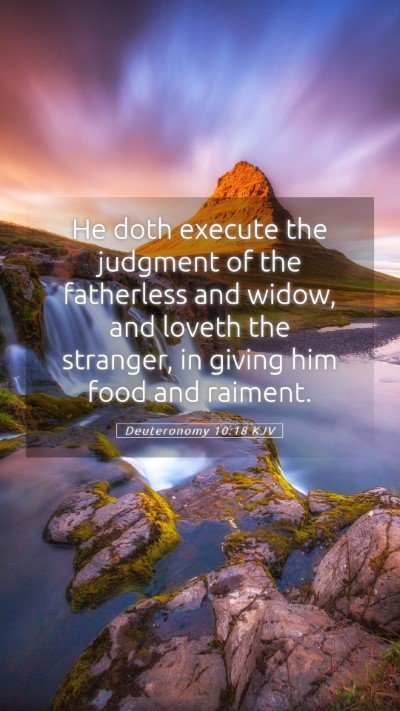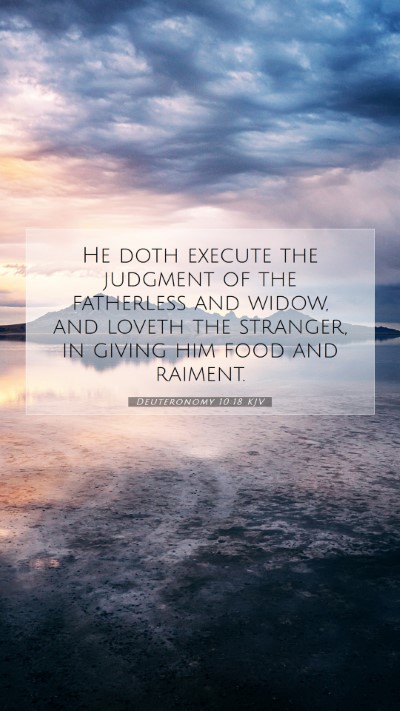Bible Verse Meaning and Interpretation: Deuteronomy 10:18
Deuteronomy 10:18 reads: "He executes justice for the fatherless and the widow, and loves the stranger, giving him food and clothing". This verse emphasizes God's character as a just and loving protector who cares for the vulnerable in society. Below, we delve into the insights from public domain commentaries, including those by Matthew Henry, Albert Barnes, and Adam Clarke, to examine the meaning of this verse and its application in our lives.
Understanding God's Justice and Love
The key themes of justice and compassion are prevalent throughout the Bible. In Deuteronomy 10:18, the verse highlights God's special concern for the marginalized, specifically the fatherless, widows, and strangers.
-
Matthew Henry's Commentary:
Henry notes that God's execution of justice denotes His active role in providing for those who are often neglected or oppressed by society. The fatherless and widows represent those in need of protection and support, while the stranger symbolizes anyone who might be outside the community's social safety net.
-
Albert Barnes' Commentary:
Barnes elaborates on the concept of God's love for strangers, stressing that this love manifests in practical ways. By providing food and clothing, God demonstrates that love must be shown through tangible actions and not merely words.
-
Adam Clarke's Commentary:
Clarke points out the sociocultural context of this verse, where the welfare of the less fortunate was paramount in the community life of Israel. He emphasizes that God’s attention to the fatherless and widows calls upon His people to emulate this compassion in their own lives.
Application of Deuteronomy 10:18
Understanding Deuteronomy 10:18 is crucial for any believer looking to apply Scripture to daily life. The verse transcends its historical context and offers lessons on how we should engage with justice and love in our communities today.
-
Call to Action:
Believers are challenged to advocate for and support the marginalized in society, echoing God's heart for justice as revealed in this verse. This includes providing help for orphans, widows, and immigrants, ensuring that they receive care and respect.
-
Community Engagement:
Churches and Bible study groups should focus on outreach programs that aim to meet the needs of the less fortunate, reflecting the love and justice of God. This could manifest through food banks, clothing drives, or direct support initiatives.
Related Scriptures for Further Study
For a broader understanding and deeper insight, consider exploring these related Bible verses:
- Psalm 68:5: "A father of the fatherless, a defender of widows, is God in His holy habitation."
- James 1:27: "Pure and undefiled religion before God and the Father is this: to visit orphans and widows in their trouble, and to keep oneself unspotted from the world."
- Exodus 22:22-24: "You shall not afflict any widow or fatherless child... for if you afflict them in any way, and they cry at all to Me, I will surely hear their cry."
Conclusion
Deuteronomy 10:18 serves as a powerful reminder of God's justice and His compassionate heart toward the fatherless, widows, and strangers. For those seeking bible verse meanings and bible verse interpretations, this passage reinforces the importance of reflecting God's love through our actions. By engaging with the verse and its context, we not only deepen our understanding of Scripture but also enhance our ability to apply these teachings in our daily lives.
For Further Bible Study Insights
As we reflect on this verse, we encourage believers to delve into further bible study resources to expand their bible study insights and explore how to interpret Bible verses effectively. Engaging in online Bible study, attending bible study lessons, and utilizing bible study tools can help cultivate a richer understanding of the Scriptures.
In-Depth Bible Verse Analysis
Exploring the historical context of Bible verses can significantly enhance one’s comprehension. Understanding the societal structures and norms that existed during the time of Deuteronomy enriches our biblical exegesis and invites us to consider the implications for contemporary situations.
By integrating the rich themes of justice, love, and community care found in Deuteronomy 10:18, believers can live out their faith actively, ensuring that they mirror God’s character in a world that often overlooks the vulnerable.


